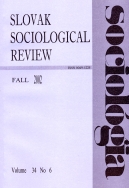Theorising Identity, Nationality and Citizenship: Implications for European Citizenship Identity
Theorising Identity, Nationality and Citizenship: Implications for European Citizenship Identity
Author(s): Lynn JamiesonSubject(s): Social Sciences
Published by: SAV - Slovenská akadémia vied - Sociologický ústav
Keywords: Identity; nationality; citizenship; European citizenship; global identity; Identity: the Elastic Concept; Social Categorisation and Group Membership; Identity; Agency and Structure; ‘Citizenship Identity’?;
Summary/Abstract: Theorising Identity, Nationality and Citizenship: Implications for European Citizenship Identity. This paper reviews theoretical approaches to the key concepts of ‘identity’ and ‘citizenship’ exploring their implications for the possibilities of European citizenship and European identity. In many circumstances and for many people, ‘being European’ is more likely to be an abstract categorising of self and/or others rather than a strongly felt sense of common identity and belonging. In reviewing theoretical discussion of ‘identity’, this paper reasserts the value of a social constructionist position that people have one self but many identities, some more ‘primary’ than others. This approach goes beyond the conclusion that, while neither local nor national identity is necessarily ‘primary’, local identity is more likely to be ‘primary’, to offer clues about the conditions required for supra-national identities such as European or ‘global identity’ to become ‘primary’. Discussions of processes creating identification with others and a sense of ‘belonging’, social categorisation and processes of group membership, ‘othering’ and boundary work, are briefly reviewed before turning to the debate over ‘agency’ and ‘structure’ that runs through discussions of identity. This provides a reminder that different national contexts offer access to different resources with which to build local, national and European identities and that within one nation-state, not all have the same degrees of freedom to create identities. The article concludes with debate concerning whether and in what circumstances being a citizen moves from membership of an abstract category to becoming an important aspect of sense of self. At the moment, it is privileged minorities who have the resources and connections that encourage freely travelling across Europe who are the most likely to be ‘European’. For European citizenship to be a more significant aspect of many people’s personal identities, local circumstances and the everyday social interactions would have to refer to and celebrate the European Union in a way that they do not at the moment. There are very few scenarios for this happening, a some of them negative, associated with the growth of ethnic citizenship and ‘fortress Europe’. The more positive possibilities of young people international movements that concern themselves with political and social rights typically celebrate more abstract principles of fairness and justice, perhaps promoting ‘global’ rather than ‘European’ citizenship. Sociológia 2002 Vol 34 (No. 6: 507-532)
Journal: Sociológia - Slovak Sociological Review
- Issue Year: 2002
- Issue No: 6
- Page Range: 506-532
- Page Count: 26
- Language: English

